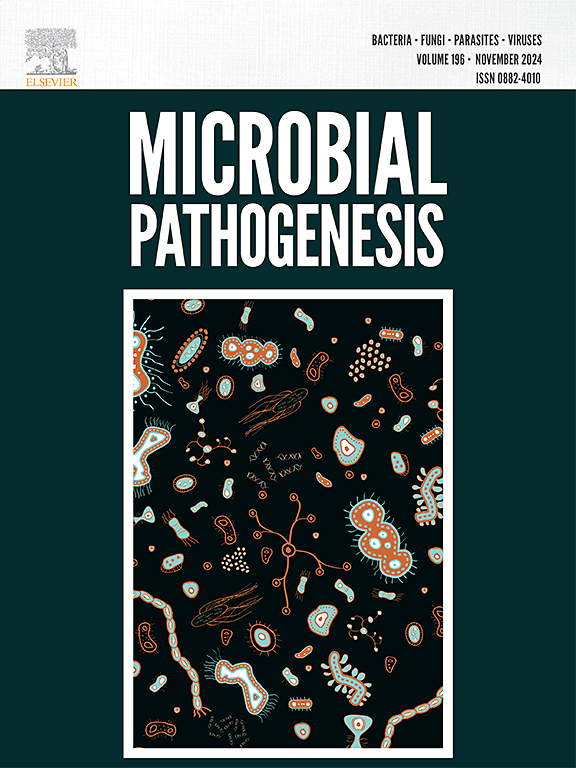Development of a novel nanobody-fused flagellin adjuvant to enhance immunogenicity in a PCV2 subunit vaccine
IF 3.5
3区 医学
Q3 IMMUNOLOGY
引用次数: 0
Abstract
Porcine circovirus type 2 (PCV2) infection causes significant economic losses in the global swine industry. The capsid (Cap) protein serves as the core antigen in PCV2 subunit vaccines, but its weak immunogenicity necessitates adjuvants to enhance the induced immune responses. Bacterial flagellin proteins are ideal candidates for next-generation vaccine adjuvants. In this study, we designed a novel flagellin-based adjuvant by co-expressing bacterial flagellin with nanobodies (Nb) specific to the PCV2 Cap protein (Nbcap-flagellin). This recombinant fusion protein leverages the high-affinity binding ability of the nanobodies to bind the Cap protein, forming an antigen-adjuvant complex to enhance vaccine immunogenicity. We further evaluated the effect of this nanobody-fusion flagellin adjuvant to enhance the immune response in mice to a subunit vaccine with PCV2 Cap protein as the model antigen. The results demonstrated that vaccination of mice with PCV2-Cap and Nbcap-flagellin adjuvant (Cap + Nbcap-flagellin) vaccine induced significantly higher levels of ELISA titers of Cap-specific antibodies, neutralizing antibodies, and immune-related cytokines compared to the PCV2-Cap vaccine without adjuvant (Cap) and the mixture of Cap protein with flagellin (Cap + flagellin). Following virulent PCV2 challenge, addition of the Nbcap-flagellin adjuvant to the PCV2 subunit vaccine significantly reduced the viral load in the serum of PCV2-challenged mice and prevented pathological changes in lymphoid tissue. These findings suggested that the Nbcap-flagellin adjuvant could enhance the immune response and provide better protection against PCV2 infection, making it a promising candidate for improving the efficacy of PCV2 subunit vaccines.
一种新型纳米体融合鞭毛蛋白佐剂增强PCV2亚单位疫苗的免疫原性
猪圆环病毒2型(PCV2)感染给全球养猪业造成重大经济损失。衣壳蛋白(Cap)是PCV2亚单位疫苗的核心抗原,但其免疫原性较弱,需要佐剂来增强诱导的免疫应答。细菌鞭毛蛋白是下一代疫苗佐剂的理想候选物。在这项研究中,我们设计了一种新的鞭毛蛋白佐剂,通过将细菌鞭毛蛋白与PCV2 Cap蛋白特异性纳米体(Nbcap-flagellin)共表达。该重组融合蛋白利用纳米体的高亲和力结合能力与Cap蛋白结合,形成抗原-佐剂复合物,增强疫苗的免疫原性。我们进一步评估了这种纳米体融合鞭毛蛋白佐剂对以PCV2 Cap蛋白为模型抗原的亚单位疫苗增强小鼠免疫应答的作用。结果表明,接种PCV2-Cap和nbcap -鞭毛蛋白佐剂(Cap + nbcap -鞭毛蛋白)疫苗的小鼠,与不接种佐剂(Cap)和Cap蛋白与鞭毛蛋白混合(Cap +鞭毛蛋白)的PCV2-Cap疫苗相比,可显著提高小鼠的Cap特异性抗体、中和抗体和免疫相关细胞因子的ELISA滴度。在毒力强的PCV2攻毒后,在PCV2亚单位疫苗中加入nbcap -鞭毛蛋白佐剂可显著降低PCV2攻毒小鼠血清中的病毒载量,并防止淋巴组织的病理改变。这些结果表明,nbcap -鞭毛蛋白佐剂可以增强免疫应答,并对PCV2感染提供更好的保护,使其成为提高PCV2亚单位疫苗效力的有希望的候选物。
本文章由计算机程序翻译,如有差异,请以英文原文为准。
求助全文
约1分钟内获得全文
求助全文
来源期刊

Microbial pathogenesis
医学-免疫学
CiteScore
7.40
自引率
2.60%
发文量
472
审稿时长
56 days
期刊介绍:
Microbial Pathogenesis publishes original contributions and reviews about the molecular and cellular mechanisms of infectious diseases. It covers microbiology, host-pathogen interaction and immunology related to infectious agents, including bacteria, fungi, viruses and protozoa. It also accepts papers in the field of clinical microbiology, with the exception of case reports.
Research Areas Include:
-Pathogenesis
-Virulence factors
-Host susceptibility or resistance
-Immune mechanisms
-Identification, cloning and sequencing of relevant genes
-Genetic studies
-Viruses, prokaryotic organisms and protozoa
-Microbiota
-Systems biology related to infectious diseases
-Targets for vaccine design (pre-clinical studies)
 求助内容:
求助内容: 应助结果提醒方式:
应助结果提醒方式:


